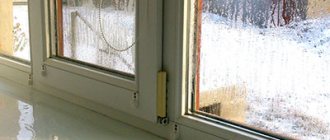Fogging of plastic windows: causes and solutions.
Plastic windows are very well adapted to any climatic conditions. It is also worth noting that they do not require special care and do not need painting, which greatly facilitates their operation.
But, unfortunately, like any thing, plastic windows have their drawbacks. The main thing, perhaps, can be called their periodic fogging. It is this problem that we will talk about today, and we will also try to find ways to solve it.
Why do plastic windows in apartments and private houses sweat and cry?
It will not be news to anyone that every person wants to arrange their home as best as possible. Interior decoration of an apartment and house, choice of interior - all this is necessary and important. But you must admit that it is not only these things that determine how comfortable and cozy you will be in your own home.
Today, the issue of choosing windows is also relevant. Over the past few years, plastic windows have taken a leading position among all other types. Such windows are in great demand and popularity, and this is well deserved.
Thanks to a number of advantages of plastic windows, more and more people are choosing them, throwing away their old wooden frames without any hesitation. What advantages are we talking about?
For those who don’t know yet, we’ll tell you. Firstly, it has excellent tightness, thanks to which the heat in the house will be preserved as much as possible, and extraneous sounds will not disturb. Secondly, this is their durability.
To begin with, I would like to make it clear that fogging is the appearance of water directly on the surface of the window. It is this formed water that is called condensate. of reasons why windows sweat, both in an apartment and in a private house, regardless of what it is built from.
Foggy window
Let's look at the main ones:
- Poor quality assembly and installation. There is an opinion among people that this is the very first and most common cause of weeping windows. But no matter how much you would like to believe it, it is not so. Yes, this happens. And most often this happens due to the inexperience of the technician or low-quality components, but, unfortunately, no one is immune from this. To reduce your chances of getting into a similar situation, take your choice of a professional, and the windows themselves, very seriously.
- A more common cause of foggy windows is the lack of good ventilation in the apartment or house. To fix this problem, you need to take some time to clean your vents and clean them if necessary.
- Would you believe that your favorite indoor plants standing on the windowsill can cause such inconvenience? If not, then it’s in vain. Due to the fact that some plants produce too much moisture, a plastic window can easily fog up.
- Lack of ventilation. Remember that any room, be it in an apartment or in a private house, must be ventilated. By the way, this can not only help get rid of foggy windows, but will also be good for your health.
- A fairly common cause of weeping windows is the location of the window sill directly above the battery. Due to this location of the window sill, air circulation in the room is disrupted, a temperature difference appears, which directly leads to the formation of water droplets on the window.
Reasons for sweaty windows
In principle, windows fog up, both in an apartment and in a house, for the same reasons. There are probably only a few factors worth noting:
- In private houses, windows “cry”, as a rule, due to the lack of a constant flow of fresh air. That is, due to poor ventilation. If in new private houses there is at least some kind of ventilation system, for example, in the toilet or in the kitchen, then in old houses everything is limited to the door. It is because of this that we get dampness, mold, and drops on the window.
- On the balcony, in principle, as in the entire apartment, a possible cause of “crying” windows could easily be renovation, either ongoing or already completed. This happens because the same recently laid tiles or just pasted wallpaper release a lot of moisture, which can settle on the window.
- In winter , plastic windows sweat much more often. The reason may be that your window is equipped with a thin double-glazed window. Such a double-glazed window does not cope in the required volume with the task of energy saving, and therefore will regularly fog up.
- Also, the reason that the windows “cry” in winter may be that it is already cold and sub-zero outside, and your windows are still operating in summer mode.
Production and installation of double-glazed windows
Although plastic window installers are professionals, even they make mistakes. Mistakes are also made by residents of premises where structures are being changed. In this case, you also need to know what to do. Why do windows sweat and “cry”? This is due to several reasons:
- Inaccuracies during the design or manufacture of windows.
- Purchasing the wrong glass unit.
- Poor installation.
Poor quality structures need to be corrected or disposed of. Buyers should choose their windows carefully. If the product will be installed inside rooms or on a loggia, you must purchase a two-chamber model. Products with 1 chamber are ideal for a room bordering a glazed loggia (since it does not need additional insulation).
For reasons of economy, many people choose thin glass, but they do not adequately protect from the cold. In addition, condensation will appear on such products. When replacing plastic products with wooden ones, you need to prepare for a change in ventilation mode. PVC is an airtight material that increases humidity inside, and there are cracks in the wood through which air is exchanged.
If you compare a plastic and wooden structure, you can find one difference - the inner glass of the first has a lower temperature, so it condenses faster. Construction errors are as follows:
- Improper foaming of cracks.
- The appearance of a “cold bridge” - the area where plastic or wood adjoins the side of the wall with a negative temperature.
- Blowing of masonry - appears with the destruction of horizontal or vertical seams between bricks.
If you want to purchase a durable product, it is important to control all stages of window installation. Also, do not buy a wide window sill.
These are the main reasons why windows sweat and cry. It is necessary to identify the cause of this phenomenon and eliminate it.
“Crying” windows in an apartment and a house: how to solve the problem?
There are a fairly large number of methods for eliminating “crying” windows. So, let's talk about the most effective and common ones:
- If you know about high humidity in your apartment or house, make it a rule to ventilate the room daily. It is also necessary to remove all indoor plants directly from the windowsill, because they release moisture, which will then settle on the window in the form of condensation.
- Provide the room with good ventilation.
- If your window can operate in two modes, then do not forget to use this function. Accordingly, in winter your window should not be in summer mode, and in summer – in winter mode.
- Don’t skimp on buying windows; remember, the stingy pays twice. Since you have decided to replace your old windows with plastic ones, choose the highest quality ones. Properly selected and installed windows will serve you for many, many years.
Solving the problem of sweaty windows
- If there is no hood in the kitchen, it would be good to purchase one. And use regularly while cooking.
- If possible, windows should be kept in the “ventilation” mode. This will ensure a constant flow of air.
- Don't forget that over time, all things break or wear out. Therefore, it would be a good idea to check the integrity of the fittings from time to time and, if necessary, replace components.
What is condensate?
In residential buildings, air masses always contain some amount of water in the form of steam. As soon as for some reason the water vapor begins to cool, small droplets appear on objects. They settle in places with the lowest temperature in the entire room, which includes windows. These settled droplets are called condensate.
The more water vapor in the air, the more condensation forms. As a result, active growth of the fungus begins. Moreover, it grows not only on window frames, but also on walls and along the windowsill.
In winter, real drizzle may appear on the windows, which is associated with the concept of dew point. This is the name of the difference in temperature outside and indoors, at which water vapor turns into ordinary water. Since the height of the dew point directly depends on the amount of water in the air, it is important to maintain a normal level of humidity in the room. If this fails, the windows will begin to fog up.
How to treat plastic windows to prevent sweating?
Another option for eliminating “crying” windows is their regular treatment.
- Of course, if possible and necessary (if the windows sweat a lot), buy special products that are designed directly to eliminate condensation on the windows. Such products, when applied to windows, create an invisible film that helps repel water. You can buy them in good household chemical stores, and you can also order them from the store where you purchased the windows. Before use, be sure to carefully read the instructions.
- is considered no less effective . To do this, you need to dissolve a tablespoon of salt (without a slide) in 5 liters of water. Filter the solution, thereby removing crystals of undissolved salt. Then wipe the window with the prepared solution. If after this procedure there are streaks or white marks left on the window, dilute the solution with a small amount of water and repeat wiping again.
Treatment of sweaty windows
- You can also use a soap solution. Take some water and add just a little bit of any detergent. Soak a microfiber cloth in the resulting solution, wring it well and wipe the window. Then rinse the window thoroughly with clean water and dry with a dry microfiber cloth.
- A solution of water and alcohol. It is recommended to use this product when the room is quite cold. You need to add very little alcohol. This solution is quite easily applied to glass, while creating good protection against moisture.
Now we propose to move on to folk remedies for eliminating “crying” windows. Agree, we all quite often resort to similar methods of solving problems, so why not use such advice in this situation?
Questions and answers
Energy-saving bags will help avoid condensation on the frame?
Only if they are installed correctly.
Do the above methods work only on PVC windows or on other frames too?
All methods are equally effective on window frames made of various materials. It is enough to use the advice correctly.
Are automotive chemicals harmful for spraying indoors?
Such liquids contain aggressive components, but when used wisely they do not cause any harm to health.
If there is high humidity in the room due to a leaky roof or the window system itself, is there any point in dealing with condensation?
No, in this case you need to eliminate the main source of the problem and only then remove the fogging.
Why don't batteries help remove excess water from the window frame?
Heat does not spread as it should. This is why the screen is installed.
Condensation on windows is a common, but very dangerous phenomenon. As soon as the first signs of fogging are noticed, they need to be eliminated. Usually this problem is solved by ordinary ventilation, but sometimes it requires a more serious solution to prevent mold from growing.
To prevent windows from sweating, what needs to be done: folk remedies
So, let's begin.
- Method for eliminating condensation using decorative candles. To do this, you need to purchase several decorative candles, preferably large ones, light them, and place them on the windowsill of the window that is fogging up. Folk advisers assure that during the burning of candles, the heat generated will normalize air circulation, thereby eliminating condensation.
- Using the well-known “Second” remedy. The liquid should be sprayed onto the problematic window, and then wipe it dry using newspapers. It is necessary to pay attention to the fact that the liquid should be distributed evenly throughout the glass, otherwise there will be no effect in places where it is absent. Newspapers must be new and clean.
- Fans. This method also aims to normalize air flow. The fan needs to be directed at the “crying” window and within 10-20 minutes the problem will be eliminated.
Eliminating window fogging with folk remedies
- Rubbing windows with a mixture of glycerin and alcohol. First, remember that the ratio of these components should be strictly 1:10. How it works? Everyone knows very well that alcohol disappears very easily and quickly. So, by applying such a solution to glass, the alcohol will quickly disappear, but glycerin will form a thin film that will prevent water from settling on the glass. So, first, wash the windows well with warm water and dry with a window napkin. A good option for a microfiber cloth would be. Spread the mixture evenly onto the glass and leave it on without rinsing.
So, today we touched on a topic that interests a huge number of people - the purchase and installation of plastic windows, and the problem of their fogging. From the above, it is not difficult to understand that there are a huge number of reasons for this unpleasant phenomenon, and in short, it is either incorrect installation of the window by the master, and excessive savings, as well as the choice of low-quality products, or high humidity, lack of good ventilation and improper operation of the window.
In order to avoid such unpleasant moments of using popular plastic windows, we recommend that you follow the tips that we have repeatedly described today, in particular - maintaining the temperature regime and controlling the humidity in the room, as well as regularly ventilating. Compliance with all these tips and careful treatment of windows will ensure you a comfortable stay in your house or apartment.
How to deal with window fogging
0
Source:
The simplest and most affordable way to prevent the appearance of moisture on glass is regular ventilation. It can be done in micro-ventilation mode or use a comb that limits the angle of inclination of the sash. You can also install a climate valve, which is a special device mounted in the upper part of the frame and regulating the flow of air into the room.
×
0
Source:
The phenomenon of leaky windows can also be prevented by:
- Installation of air conditioner;
- increasing the glass area when replacing windows: they warm up better and take longer to cool down;
- use of a convection screen;
- electrical heating equipment is similar to a car;
- the use of thin, lightweight curtains that do not impede free air circulation;
- cleaning the window sill from foreign objects;
- use of installation services only from trusted organizations and competent, qualified specialists.
You can try to solve the problem of “crying” windows using improvised means. To do this, it is necessary to treat the glass with a saline, soap or aqueous-alcohol solution. You can also use special store-bought products.
Why do windows leak?
This question will be best answered by one of the masters of our warranty and repair service, who has seen so many crying windows in his life that he almost cries when frosts begin, which once again confirms that you are not alone in your problem. But Anatoly doesn’t see the problem, which is what he wishes for everyone.
Polyansky Anatoly
Solving any problems with windows for 20 years. Almost a real window fairy, if not for the mustache. He will fix everything as quickly and efficiently as possible, immediately calm you down and instill hope for the future.
Having problems with windows? Call him now!
How we tear it away from the heart.
- Anatoly, don’t torment us. Why do plastic windows leak so often, despite the fact that they are so expensive?
— Well, first of all, it’s not just plastic windows that leak. Wooden modern windows with double glazed windows are also often seen with this problem. The reason is not the material, not the price, not the brand, not the installer, or even the waxing moon. The reason is only three components: tightness, increased humidity in the room and frost outside the window. In winter, which is logical, the temperature on the glass surface drops significantly and often reaches the dew point.
— The dew point sounds romantic, but is not understandable to the average person. What is this?
— The dew point is something that haunts you almost every day. Foggy bathroom mirror after you take a shower. Foggy glasses after you came out of the cold into a warm room. All these are manifestations of such a physical phenomenon as the dew point. If you allow me to get smart, this is the temperature at which air, with a certain temperature and humidity, can no longer absorb moisture.
- And what does this have to do with windows?
- Directly. It’s frosty outside and the wind is howling, the husband wanted hodgepodge, the child wanted pancakes. And now everything on the stove gurgles and squeaks, the humidity in the room rises, the glass, naturally, is cold in winter, so what? Hello condensation! The windows are leaking, there is a puddle on the windowsill, the housewife is in a panic, the hodgepodge has boiled. And this is just one example. You can not cook anything at home and be the happy owner of crying windows. Drying clothes, flowers on the windowsill, an aquarium of some kind and your breath, finally - all this contributes to an increase in humidity and hello, the most popular winter problem - leaking windows.
- Does it happen that there is none of this at all, but the windows still leak?
- There is always a reason. If not an aquarium with goldfish, then, for example, “wet” construction work (painting, wallpapering walls, etc.). Clogged ventilation, again. Plastic windows are sealed (if installed according to all the rules and according to GOST), fresh air from the street does not penetrate, ventilation does not fulfill its function. And the result is the same - stagnant air comes into contact with cold glass, condensation forms, and the windows leak.
— And where do windows leak most often?
- In the kitchen, of course. Cooking, kettles, multicookers, proximity to the bathroom - all this contributes to the emergence of such a problem. And residents of the upper floors often suffer due to ventilation, through which humid and unclean air enters from all the neighbors below.
— So, the lower the floor, the better?
- Is not a fact. The lower the floor, the closer the basement. It's better in the middle if there is a question of choice.
“Somehow everything hasn’t been thought out for us.” It’s bad below, bad above, the kettle is boiling - bad.
- We have everything thought out. The fact is that the houses were built taking into account the fact that there would be a constant flow of fresh air through the cracks in the windows. Sealed plastic windows + old ventilation = condensation on the glass, or even puddles on the window sills. And if the frost is severe, then there will be ice. The problem can be easily solved if, for example, forced ventilation fans with a check valve are installed in the ventilation. This is an option.
— What other pitfalls are there? Let’s say the house is new, and the ventilation is modern, and the floor is not the last, and soup is cooked once a year, and the windows are leaking. Why?
- Heating. Perhaps this is the reason. The apartment should be warm, the radiators should be in good working order and heat not just anyhow, but with all their might. And they should be located exclusively under the window! The batteries warm not only you, but also the window. Therefore, window sills that are too wide, thick curtains hanging in such a way that it is difficult for warm air to flow to the window, or, even worse, radiators covered with something - all this can lead to the window leaking sooner or later.
— And what do you do when you come to a client with a similar problem?
— I’m getting a moisture meter. This is usually enough to make a diagnosis. And in 100% of cases the windows are not sick.
- And then what?
“And then I tell you how to continue to live with such beautiful windows - the best, most airtight, incredibly well installed. And this is not sarcasm. These are the costs of the climate and construction features.
Formation of condensation on the inner surface of the glass unit
The reason - in almost 100% of cases - is a defect in the manufacture of double-glazed windows and during installation (the inadmissibility of moisture inside the chamber is also enshrined in GOST 24866–99).
This is good for the apartment owner, if only for the reason that the installation company is obliged to correct the defect.
In addition, if condensation inside the double-glazed window is not accompanied by its appearance outside, or if condensation collects on external surfaces in insignificant quantities, the problem can most likely be dealt with one way or another.











